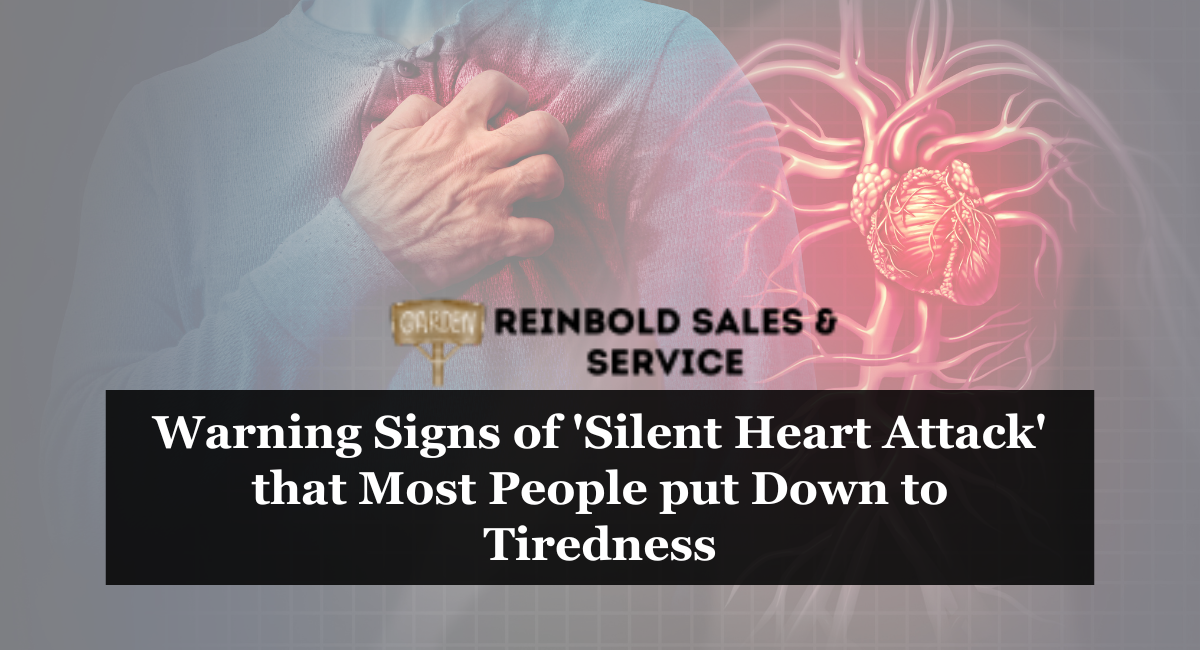Feeling worn out? It happens to everyone. But what if that nagging exhaustion masks a more serious issue – a silent heart attack?
Unlike the dramatic Hollywood portrayal of clutching your chest and collapsing, a silent heart attack can be surprisingly subtle. Here’s how to recognize the warning signs and avoid mistaking them for simple fatigue.
The Heart: A Silent Hero, But Don’t Take Its Signals Lightly
The heart is a tireless pump, delivering oxygen-rich blood throughout your body. A heart attack occurs when a blockage in the coronary arteries cuts off blood flow to a part of the heart muscle.
The classic symptoms – chest pain, shortness of breath, and arm discomfort – are well-known. However, a silent heart attack might not present with these telltale signs, especially in women and diabetics.
Beyond Tiredness: Recognizing the Sly Symptoms of a Silent Attack
While fatigue is a common symptom, a silent heart attack can manifest in unexpected ways. Here’s what to watch out for:
- Unexplained Discomfort: A general feeling of unease, tightness, or pressure in the chest, upper back, or even jaw can be a red flag. It might not be the crushing pain you expect, but any unusual discomfort warrants attention.
- Shortness of Breath: Feeling breathless during regular activities you normally manage with ease could indicate a silent attack. It might feel like you’re climbing stairs after walking a short distance.
- Lightheadedness or Dizziness: Feeling faint or dizzy for no apparent reason could be a sign of reduced blood flow to the brain due to a heart issue.
- Nausea and Sweating: Feeling nauseated or breaking into a cold sweat, particularly when accompanied by other symptoms, shouldn’t be ignored.
- Upper Body Pain: While chest pain is common, some people experience discomfort in the arms, shoulders, back, or even jaw during a silent attack.
- Fatigue Beyond Explanation: Feeling unusually tired for extended periods, even after adequate sleep, can be a silent heart attack’s hidden culprit. Don’t dismiss persistent exhaustion as just a busy life.
Why Do Silent Attacks Fly Under the Radar?
There are a few reasons why silent attacks might go unnoticed:
- Denial: We often downplay symptoms, especially if they’re not severe. Don’t ignore that nagging feeling – it could be your body’s way of alerting you to danger.
- Subtle Symptoms: The absence of classic chest pain can be misleading. Remember, a silent attack doesn’t have to follow a script – any unusual discomfort deserves investigation.
- Preconceived Notions: Women and diabetics often experience atypical heart attack symptoms. Be aware that these conditions can mask the classic signs.
Don’t Wait Until It’s Too Late: Act on Warning Signs
If you experience any combination of these symptoms, especially if they’re persistent or new, don’t hesitate to seek immediate medical attention. Early intervention is crucial in minimizing heart damage and improving long-term outcomes.
Taking Charge of Your Heart Health: Prevention is Key
While a silent heart attack can be unpredictable, there are steps you can take to reduce your risk:
- Maintain a Healthy Weight: Excess weight puts strain on your heart. Aim for a healthy weight through a balanced diet and regular exercise.
- Manage Blood Pressure: High blood pressure is a major risk factor for heart disease. Talk to your doctor about ways to keep your blood pressure under control.
- Control Cholesterol: High cholesterol levels can contribute to plaque buildup in arteries. A healthy diet and medication can help manage cholesterol.
- Embrace Exercise: Regular physical activity strengthens your heart and improves blood flow. Aim for at least 150 minutes of moderate-intensity exercise per week.
- Manage Stress: Chronic stress can take a toll on your heart health. Find healthy ways to manage stress, such as yoga, meditation, or spending time in nature.
- Quit Smoking: Smoking is a major risk factor for heart disease. Quitting smoking is one of the best things you can do for your heart health.
- Know Your Numbers: Get regular checkups with your doctor and monitor your blood pressure, cholesterol levels, and blood sugar.
Remember, you are your body’s best advocate. By being attuned to unusual symptoms and taking preventive measures, you can empower yourself to protect your heart and live a long, healthy life.
Empowering Yourself: Building a Heart-Healthy Lifestyle
While the information above might seem overwhelming, building a heart-healthy lifestyle can be an enriching journey. Here are some practical tips to get you started:
- Small Changes, Big Impact: Don’t try to overhaul your life overnight. Start with small, sustainable changes you can integrate into your daily routine. Gradually increase physical activity, swap sugary drinks for water, and incorporate more fruits and vegetables into your diet.
- Find Activities You Enjoy: Exercise shouldn’t feel like a chore. Find physical activities you genuinely enjoy, whether it’s dancing, swimming, hiking, or even brisk walking. Working out with a friend can add a social element and boost motivation.
- Make Healthy Food Choices Delicious: Eating healthy doesn’t have to be bland. Explore healthy recipes that tantalize your taste buds. There’s a world of delicious and nutritious food waiting to be discovered!
- Don’t Go It Alone: Talk to your doctor about your heart health concerns. They can guide you on managing risk factors and creating a personalized plan for prevention.
- Support Groups: A Source of Strength: Connecting with others who share your health goals can be incredibly motivating. Support groups offer a safe space to share experiences, ask questions, and gain encouragement.
